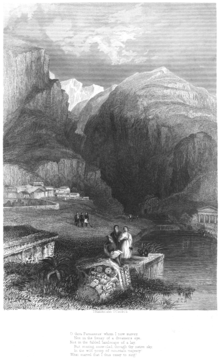Samuel Austin Allibone
| Samuel Austin Allibone | |
|---|---|
 | |
| Signature | |
|
|
Samuel Austin Allibone (April 17, 1816 – September 2, 1889) was an American author and bibliographer.
Biography
He was born in Philadelphia, Pennsylvania, of French Huguenot and Quaker ancestry. He was privately educated and for many years was engaged in mercantile business in his native city. He, however, devoted himself chiefly to reading and to bibliographical research; acquired a very unusual knowledge of English and American literature, and is remembered as the compiler of the well-known Critical Dictionary of English Literature and British and American Authors (3 vols. in royal octavo: vol. i. 1854, vols. ii. and iii. 1871). The Critical Dictionary was projected by George W. Childs, owner of the Philaldephia Public Ledger, and cost over $60,000.[1] It comprised an alphabetical author index of over 46,000 authors; the third volume included 40 subject-classified lists of authors. Two supplementary volumes, edited by John Foster Kirk, were added in 1891.
Allibone was a member of the Protestant Episcopal Church.[2] He was criticized by the Catholic World in 1872 for his alleged unfairness to Catholics, especially in relation to literature about Mary, Queen of Scots.[3]
From 1867 to 1873, and again in 1877–1879, Allibone was book editor and corresponding secretary of the American Sunday School Union; and from 1879 to 1888 he was librarian of the Lenox Library in New York City. He died at Lucerne, Switzerland, in 1889. In addition to his Critical Dictionary he published three large anthologies and several religious tracts. He contributed to the North American Review, the Evangelical Review and other periodicals.
The indexes to Edward Everett's Orations and Speeches (1850–1859), and Washington Irving's Life and Letters (1861–1864), were from his hand. He was book editor and corresponding secretary of the American Sunday School Union from 1867 until 1873, and from 1877 until 1879, when he became librarian of the Lenox Library, resigning in 1888.
Samuel Allibone's brother was Thomas Allibone (1809–1876), senior member of the family's shipping concern, Thomas Allibone & Co. Thomas Allibone was president of the large Bank of Pennsylvania at the time of its collapse in September 1857.[4]
Works
| Wikisource has original works written by or about: Samuel Austin Allibone |
- A Review by a Layman of a Work entitled 'New Themes for the Protestant Clergy', 1852
- 'New Themes' Condemned, 1853
- Explanatory Questions on the Gospels and the Acts, 1869
- A Critical Dictionary of English Literature and British and American Authors, 3 vols (1858, 1871)
- Alphabetical Index to the New Testament, 1869.
- Union Bible Companion, 1871 (with first part published separately as The Divine Origin of the Holy Scriptures)
- Poetical Quotations from Chaucer to Tennyson, 1873. This work contains 13,600 passages taken from 550 authors, classified under 435 subjects. 788 pages, illustrated with twenty steel engravings.

- Prose Quotations from Socrates to Macaulay, 1875. This work contains 8,810 quotations, containing the names of 544 authors and 571 subjects
- Great Authors of All Ages, 1879
Notes
- ↑ Barrows, C. Acts and Anecdotes of Authors, 1887
- ↑ The National cyclopaedia of American biography, 1898
- ↑ Barrows, C. Acts and Anecdotes of Authors, 1887
- ↑ History of the Friendly Sons of St. Patrick and of the Hibernian Society for the Relief of Immigrants from Ireland, John Hugh Campbell, Hibernian Society, 1892
References
- Samuel D. McConnell, In memory of S. Austin Allibone, A.M., LL. D, Philadelphia, 1890. Address delivered before the Historical Society of Philadelphia.
 Chisholm, Hugh, ed. (1911). "Allibone, Samuel Austin". Encyclopædia Britannica (11th ed.). Cambridge University Press.
Chisholm, Hugh, ed. (1911). "Allibone, Samuel Austin". Encyclopædia Britannica (11th ed.). Cambridge University Press. Wilson, James Grant; Fiske, John, eds. (1900). "Allibone, Samuel Austin". Appletons' Cyclopædia of American Biography. New York: D. Appleton.
Wilson, James Grant; Fiske, John, eds. (1900). "Allibone, Samuel Austin". Appletons' Cyclopædia of American Biography. New York: D. Appleton.
External links
- Works by or about Samuel Austin Allibone in libraries (WorldCat catalog)
- A Critical Dictionary, Vol. I (A-H) at the Internet Archive; there are also versions of Vol. II and Vol. III available, but they are not so well scanned.
|